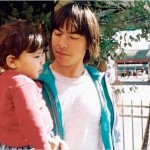Dir. by María Victoria Menis
Félix (Leonardo Ramírez) is a young drifter who, in the opening act of Little Sky, jumps from a train, stumbles into conversation at a local bar, and finds himself working for room and board at a small farm. Its owners, Roberto (Dario Levy) and Mercedes (Mónica Lairana), seem content on first glance, but Félix soon discovers that Roberto’s drunken violence is the source of Mercedes’s quiet reserve and depression. When Mercedes finally leaves her husband, Félix takes her infant son Chango, with whom he has developed a close bond, and flees for the economic promise of Bueno Aires.
Like a Frank Norris or Theodore Dreiser novel, Little Sky drives steadily toward its inevitable, and inevitably dark, conclusion. Despite his genuinely good intentions, Félix’s dreams of providing the stable family for Chango that he, also an orphan, lacked are romantic lies, and we in the audience can see it coming for miles. But Menis’s direction makes it a fairly compelling story, nonetheless. I quite liked the first half of the film and particularly enjoyed her handling of Félix’s and Mercedes’s relationship, which manages to avoid the most obvious of narrative cliches: the stud drifter bedding the sexually repressed, kept woman (see Schizo). Levy also gives what at times is a nicely sympathetic performance as the abusive husband.
Soon after Félix and Chango arrived in Buenos Aires, however, I lost interest in the film and began waiting for it to end. Films of the type that play at film festivals typically resist narrative closure; they delight, instead, in ambiguity, allowing viewers to draw conclusions of their own. I’ll admit to a strong preference for this type myself, but I’m beginning to wonder how often “ambiguity” is, in fact, a cheap excuse for sloppy writing. Little Sky is clearly intended to be a social film with political ends, and so I recognize Menis’s need to carry her story through to its predetermined, tragic finale. But I think it would be a much better film if she spent even more time developing her three main characters at the farmhouse and ended it on the train to the city. Ambiguity. Just how I like it. So can this desire for ambiguity be a political or intellectual cop-out? That question, to be honest, interests me more than this film did.
